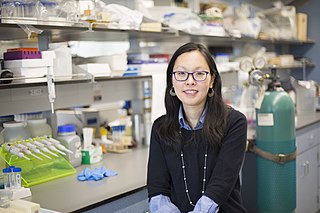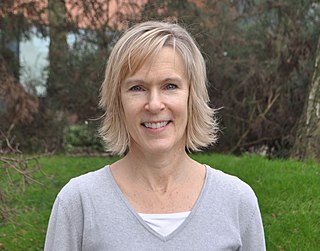Related Research Articles

Adam S. Veige is a professor of Chemistry at the University of Florida. His research focuses on catalysis and the usage of inorganic compounds, including tungsten and chromium complexes.
Anne Hiltner was an American polymer scientist who founded the Center for Applied Polymer Research (CAPRI) and was later instrumental in the founding of the Center for Layer Polymeric Systems (CLiPS), a National Science Foundation Science and Technology Center at Case Western Reserve University. She served as Director of the Center for Layered Polymeric Systems from its founding in 2006 until her death in 2010.
Sarah Elizabeth Reisman is a Chemistry Professor at the California Institute of Technology. She received the (2013) Arthur C. Cope Scholar Award and the (2014) Tetrahedron Young Investigator Award for Organic Synthesis. Her research focuses on the total synthesis of complex natural products.

Malika Jeffries-EL is an American chemist and professor of chemistry at Boston University studying organic semiconductors. Specifically, her research focuses on developing organic semiconductors that take advantage of the processing power of polymers and the electronic properties of semiconductors to create innovative electronic devices. She was elected as a Fellow of the American Chemical Society in 2018.
Eilaf Egap is an assistant professor of Materials Science at Rice University. She works on imaging techniques and biomaterials for early diagnostics and drug delivery. She was a Massachusetts Institute of Technology MLK Visiting Scholar in 2011.

Jin Kim Montclare is a Professor of Chemical and Biomolecular Engineering at New York University. She creates novel proteins that can be used in drug delivery, tissue regeneration and as medical treatment. She is a 2019 AAAS Leshner Leadership Fellow and has been inducted to the AIMBE College of Fellows.

Hemamala Indivari Karunadasa is an assistant professor of chemistry at Stanford University. She works on hybrid organic – inorganic materials, such as perovskites, for clean energy and large area lighting.

Heather D. Maynard is the Dr Myung Ki Hong Professor in Polymer Science at the University of California, Los Angeles. She works on protein-polymer conjugates and polymeric drugs. Maynard is a Fellow of the Royal Society of Chemistry and the American Association for the Advancement of Science.

Thuc-Quyen Nguyen is director and Professor at the Center for Polymers and Organic Solids (CPOS), and a professor of the Chemistry & Biochemistry department at the University of California Santa Barbara. Her research focuses on organic electronic devices, using optical, electrical, and structural techniques to understand materials and devices such as photovoltaics, LEDs, and field-effect transistors.

Kristi Lynn Kiick is the Blue and Gold Distinguished Professor of Materials Science and Engineering at the University of Delaware. She studies polymers, biomaterials and hydrogels for drug delivery and regenerative medicine. She is a Fellow of the American Chemical Society, the American Institute for Medical and Biological Engineering, and of the National Academy of Inventors. She served for nearly eight years as the deputy dean of the college of engineering at the University of Delaware.
Geoffrey "Geoff" William Coates is an American chemist and the Tisch University Professor in the department of chemistry and chemical biology at Cornell University.
Luisa Whittaker-Brooks is an American chemist who is an associate professor at the University of Utah. She was named a L'Oréal-UNESCO For Women in Science honouree in 2013 and one of Chemical & Engineering News' Talented 12 in 2017.
Nancy Sarah Goroff is an American organic chemist who formerly served as chair of the chemistry department at Stony Brook University. Her research investigates conjugated organic molecules, including polymers, halocarbons and buckyballs. During the 2020 United States elections Goroff ran to represent New York's 1st congressional district, and was defeated by the incumbent, Lee Zeldin.
Arthi Jayaraman is an Indian-American scientist who is the Centennial Term Professor for Excellence in Research and Education at the University of Delaware. Her research considers the development of computational models to better understand polymer nanocomposites and biomaterials. Jayaraman was elected Fellow of the American Physical Society in 2020.
Ellen Sletten is an American chemist who is the John McTague Career Development Chair at University of California, Los Angeles. Her research considers the use of physical organic chemistry for diagnostics and medical therapies.
Thomas Lectka is an American organic chemist, academic and researcher. He is Jean and Norman Scowe Professor of Chemistry and leads the Lectka Group at Johns Hopkins University.
Jennifer Lyn Roizen is an American chemist who is a professor at Duke University. Roizen studies C-H functionalization, antibiotics and selective ion channel inhibitors. She joined the International Advisory Board of Angewandte Chemie in 2021.
Shu Yang is a Chinese-American materials scientist who is the Joseph Bordogna Professor of Engineering and Applied Science and Chair of the Department of Materials Science and Engineering at the University of Pennsylvania. She is a Fellow of the Royal Society of Chemistry, American Physical Society, National Academy of Inventors and Materials Research Society.
Song Lin is a Chinese-American organic electrochemist who is an associate professor at Cornell University. His research involves the development of new synthetic organic methodologies that utilize electrochemistry to forge new chemical bonds. He is an Associate Editor of the journal Organic Letters, and serves on the Early Career Advisory Board of Chemistry - A European Journal. He was named by Chemical & Engineering News as one of their Trailblazers of 2022, a feature highlighting LGBTQ+ chemists in academia.
Rebekka Klausen is an American chemist who is the Second Decade Society Associate Professor at Johns Hopkins University. Her research considers carbon and silicon-based nanomaterials for optoelectronic devices. She was a finalist for the 2021 Blavatnik Awards for Young Scientists.
References
- ↑ "Leighton Group Members". www.columbia.edu. Retrieved 2019-08-24.
- 1 2 "Reactions: Julia Kalow : The Sceptical Chymist". blogs.nature.com. Retrieved 2019-08-24.
- ↑ "Newsletter". www.columbia.edu. Retrieved 2019-08-24.
- ↑ "Klein Addresses Newest Alumni | Columbia College Today". www.college.columbia.edu. Retrieved 2022-01-29.
- ↑ "A Day in the Life: Julia Kalow". Princeton University Media Central. Retrieved 2019-08-24.
- ↑ "Video | Princeton University Department of Chemistry". chemistry.princeton.edu. Retrieved 2019-08-24.
- ↑ "Graduate Research Fellowships". ACS Division of Organic Chemistry. Retrieved 2019-08-24.
- ↑ "Dr. Julia Kalow, MIT | Department of Chemistry". chemistry.stanford.edu. Retrieved 2019-08-24.
- ↑ "A year in the life of a new professor". cen.acs.org. Retrieved 2019-08-24.
- ↑ "CSP Team". UMN. Retrieved 2019-08-24.
- ↑ "How biodegradable plastic bags don't live up to their name". PBS NewsHour. 2019-05-02. Retrieved 2019-08-24.
- ↑ "The MONET Team – MONET" . Retrieved 2019-08-24.
- ↑ Kalow, Julia A.; Accardo, Joseph V. (2018-07-11). "Reversibly tuning hydrogel stiffness through photocontrolled dynamic covalent crosslinks". Chemical Science. 9 (27): 5987–5993. doi:10.1039/C8SC02093K. ISSN 2041-6539. PMC 6050525 . PMID 30079213.
- ↑ "Searle Fellows Program: Office of the Provost - Northwestern University". www.northwestern.edu. Retrieved 2019-08-24.
- ↑ "Three Northwestern professors named Sloan Research Fellows". news.northwestern.edu. Retrieved 2022-06-05.
- ↑ "2021 Camille Dreyfus Teacher-Scholar Awards". Dreyfus Foundation. 2021-04-30. Retrieved 2021-06-10.
- ↑ "Two young faculty members receive prestigious NSF CAREER awards". news.northwestern.edu. Retrieved 2019-08-24.
- ↑ "NSF Award Search: Award#1847948 - CAREER: Photocontrolled Dynamic Covalent Crosslinkers for Light-Responsive Polymer Networks". nsf.gov. Retrieved 2019-08-24.
- ↑ Kalow, Julia (2019-07-12). "Julia Kalow Recognized as PMSE Young Investigator". UMN. Retrieved 2019-08-24.
- ↑ "Kalow Receives 3M Non-Tenured Faculty Award: Department of Chemistry - Northwestern University". www.chemistry.northwestern.edu. Retrieved 2019-08-24.
- ↑ "Previous Winners - Thieme Chemistry - Georg Thieme Verlag". Thieme. Retrieved 2019-08-24.
- ↑ "AFOSR Awards Grants to 45 Scientists and Engineers through its Young I". Wright-Patterson AFB. 11 October 2017. Retrieved 2019-08-24.